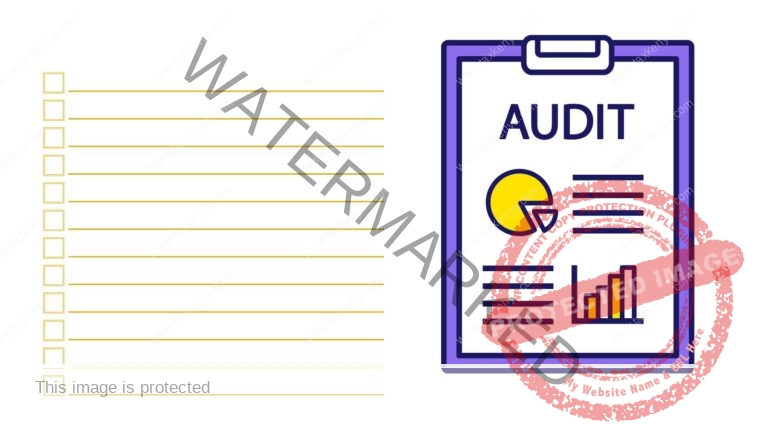Introduction
Every taxpayer, in their lifetime, should expect communication about their tax affairs from the tax authority.
(Post continues after photo)

(Technology Examination. Photo by Waka)
In Kenya, the communication will come from Kenya Revenue Authority (KRA). The communication can be in the form of a letter, a phone call, an email or a visit etc.
[bha id=’https://www.bluehost.com/track/wakaguyu’ size=’190×60′ variation=’01’ align=’none’]
The tax authority will seek answers for questions concerning the tax operations by the taxpayer or confirm the status of the taxpayers’ tax affairs.
What is a tax audit?
The word audit has similar meaning to examine, investigate, look over, evaluate etc. Hence, a tax audit is examination, investigation, looking over, evaluating etc. of books and records of accounts for taxation purposes.
The records and books include tax invoices, delivery notes, audited accounts, tax returns, bank statements etc. Tax audits are conducted for all tax types that are administered by the tax authority such as Pay As You Earn (PAYE), corporate tax, Value Added Tax (VAT), Domestic excise duty, Customs and Excise duty etc.
Types of tax audits
Tax audits can be categorized depending on various factors. Two commonly used factors are:
- Where tax audits are conducted from.
- Depth of tax audits.
Where tax audits are conducted from
There are three types of tax audits depending on where the tax audit is conducted from:
a) Desk tax audits
The tax officers examine taxpayer’s records and books either in manual format or electronic formats in the tax authority’s office. The tax audits can be conducted via a phone interview, email with a list of several questions, Skype etc.
The tax audits rely on the physical copies or electronic records and books of accounts that the taxpayer has submitted to the tax authority. In this type of tax audits, there is more reliance on technology. In-depth examination of the records and books may not be tenable in these type of tax audits. However, tax audits for compliance purposes are feasible in desk tax audits.
b) Field tax audits
The tax officers leave their offices and go to a taxpayer’s premises and conduct the tax audits from there. The officers examine both physical and electronic records and books from the taxpayer’s premises.
The officers may ask for copies of the records in physical or electronic format. These types of tax audit rely heavily on what the taxpayer has submitted to the tax authority and what the taxpayer has in the office. A closer examination and scrutiny of the taxpayer’s affairs is plausible in these types of tax audits.
c) A mix of desk and field tax audits
Part of the tax audits are conducted done in the taxpayer’s premises while part is conducted in the tax authority’s offices. These types of tax audits rely on the information already provided by the taxpayer to the tax authority and what the taxpayer has on their premises.
During these types of tax audits, there is an in-depth examination of the taxpayer’s tax records and books of accounts. These tax audits allow for in-depth analysis and inspection of taxpayers records and books of accounts.
Of the three types of tax audits, a mix of desk and field audits is the one widely used. This is because the exercise avails the officers the opportunity to go beyond mere examination of records and books of account.
The officers are also required to report to their work stations every day. The officers may not have access to some of the information while in the field for example access the tax authority’s electronic systems.
Depth of tax audits
No matter where the tax audits are conducted from, the tax audits vary according to intensity, depth and thoroughness of the exercise. There are tax audits determined by the depth of examination of the records and books of accounts for taxation purposes. There are three categories of tax audits:
a) Compliance tax audits
These types of tax audits are aimed at determining whether taxpayers are complying with tax laws. The tax officers rely on the information provided or not provided by taxpayers either in physical format or electronic format.
In these audits, few records and books of accounts are examined. For example, failure to submit tax returns or remit tax will trigger a compliance tax audit. The tax audits can either be desk or field audits.
These audits are normally conducted when there is information to the tax authority that the taxpayer is not complying with the tax law. The information can be internally generated or it can emanate from out of the tax authority.
b) Normal tax audits
These types of tax audits are an examination of records and books of accounts to ensure that the taxpayer is complying with the tax laws. The audits examine more records and books of account unlike in compliance audits. However, the audits may take a longer time and cover more years of income.
The tax audits may not be triggered by any specific event. However, the taxpayers are audited because it is their time to be audited according to the activity calendar of the tax authority. For example, the tax authority may have a calendar of auditing large taxpayers after every three years of income.
Normal tax audits are routinely conducted in the field and rely on both physical and electronic records and books of account and any other documents. All types of taxes are audited.
c) In-depth tax audits
These types of tax audits are thorough examinations that mostly cover all aspects of a tax and several tax types over several years of income. In-depth tax audits are similar to normal tax audits but the examination of the records and books of accounts is deeper.
Tax officers have different skills and experiences. Hence, the tax officers who conduct in-depth tax audits are more experienced and have a range of other skills including technological, forensic, psychology etc.
In-depth tax audits are mostly a mixture of desk and field audits relying on the information provided by the taxpayers to the tax authority, information that the taxpayers may be holding and information from third-party sources.
The tax audits cover several years of income and all the tax systems administered by the tax authority. In most cases, huge amounts of tax liabilities are raised.
d) Investigation tax audits
Investigation tax audits are targeted audits that examine certain aspects of tax for example tax evasion or tax avoidance. The tax audits rely on information emanating from third parties which conflict with the information provided by the taxpayer.
Investigation tax audits can be desk tax audits or field tax audits. The tax audits mostly cover specific tax systems for a specific number of years of income.
The information that the tax officers rely on may be provided by the investigation units of the tax authority, professional investigators, government agencies such as anti-corruption authority, the public, the media etc. The information can also be sourced from within the tax authority in records and books submitted by the taxpayer.
Conclusion
Tax audits may not be necessarily categorized as above but the most important things to note are:
- Tax audits are examinations of books, records etc. of accounts.
- The purpose of tax audits is to ensure that the taxpayer is complying with tax laws.
- The tax authority can choose to utilize all or some of the tax audit types.
Our Call …. remember to subscribe to get our latest tax articles.
[bha id=’https://www.bluehost.com/track/wakaguyu’ size=’190×60′ variation=’01’ align=’none’]
Feel free to send us questions or topics on tax and investments in Kenya that you would wish to be covered in this Website.
Disclaimer
This post is for general overview and guidance and does not in any way amount to professional advice. Hence, www.taxkenya.com, its owner or associates do not take any responsibility for results of any action taken on the basis of the information in this post or for any errors or omissions. Kenyan taxpayers must always rely on the most current information from KRA. Tax industry in Kenya is very dynamic.
©Wakaguyu Wa Kiburi
[about-me id=”1″]
Email: taxkenya@gmail.com
Twitter: @taxkenya
Facebook: fb.me/taxkenya
Youtube: youtube/taxkenya.com shows





